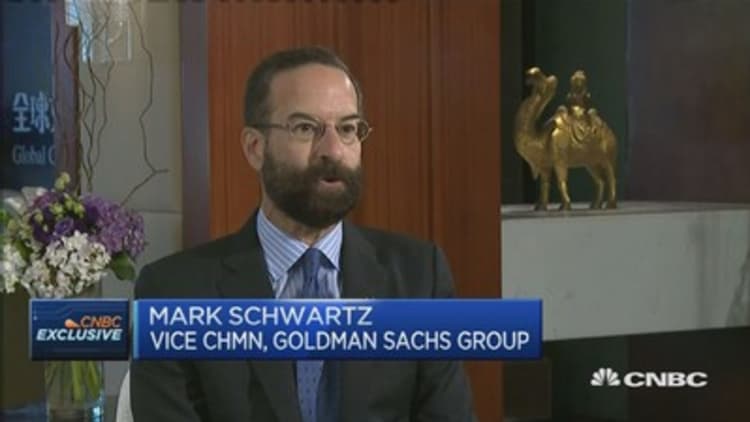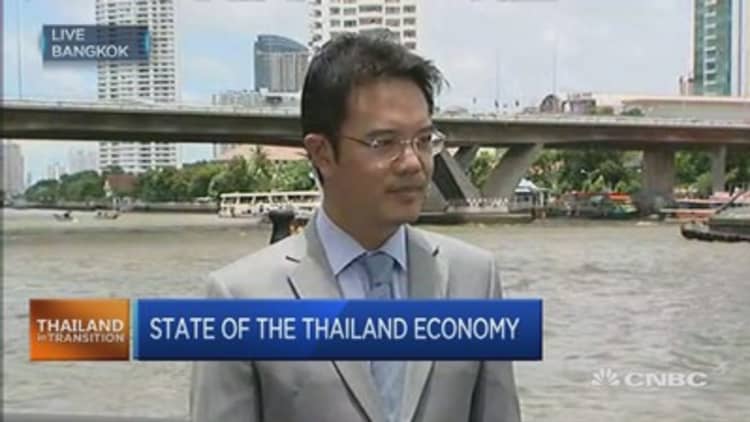Mainland shares took the limelight on Friday, with the Shanghai Composite clinching a fresh seven-year peak, while markets in Japan edged up to finish the week at their highest levels in 15 years.
Overnight, U.S. stocks finished modestly higher, with the S&P 500 settling at a record high amid slightly lower bond yields and as investors read mixed economic data as a sign that interest rates could stay lower for longer.
The S&P 500 added 0.23 percent to 2130.82, topping its previous record close of 2129.20 and posting its 10th record closing high for the year. Led by robust gains in Apple and Amazon shares, the tech-heavy Nasdaq notched up 0.4 percent, while the Dow Jones Industrial Average ended unchanged.
Mainland markets rally
China's benchmark index surged 2.8 percent to hit fresh seven-year highs, as "unused funds from recent new-share listings have been repositioned back into the domestic market," wrote IG's chief market strategist Chris Weston in a note.
For the week, the Shanghai Composite jumped 2.8 percent, marking its biggest weekly gain since December, according to Reuters.
Financials, insurers and brokerage houses led the charge; Agricultural Bank of China closed up 3 percent, while Bank of China and China Construction Bank rose 2.7 percent each. Haitong Securities and Citic Securities elevated 3.4 and 2.5 percent, respectively, while Ping An Insurance bounced up 3.4 percent.
Meanwhile, Hong Kong shares shook off the sluggishness from earlier in the week to end up 1.7 percent, hitting a more than two-week high.
Goldin Financial Holdings and Goldin Properties Holdings were in focus after tumbling nearly 50 percent in the previous session to their lowest levels since March 17 and April 20, respectively. The former turned negative in the final hour of trade to close down 3.09 percent, while the latter enjoyed a reprieve, up 6.27 percent.
Underperforming the bourse, Lenovo Group tanked 5 percent, weighed down by less-than-stellar annual results released on Thursday. Li & Fung also lost 2.5 percent on news that Wal-Mart Stores will be taking back much of the business it outsourced to the Hong Kong-based factory middleman.

Nikkei adds 0.3%
Japan's Nikkei 225 index turned positive late Friday to finish at its highest level since April 2000, extending gains into a sixth consecutive day. The Tokyo bourse had slipped into the red earlier in the day as investors awaited the BOJ's decision. For the week, the index rose 2.7 percent.
Decliners slightly outnumbered gainers, with exporters and banking counters among the hardest-hit. Blue-chip Toyota Motor closed down 0.91 percent, while Canon and Nintendo slumped more than 1 percent each. Mitsubishi UFJ Financial Group led losses in the banking sector to drop 0.8 percent.
Restaurant chain Skylark settled down 5.46 percent, after diving as much as 11 percent in the morning session, on news that U.S. private equity firm Bain Capital will reduce its 70 percent stake in the company by nearly 20 percent.
Meanwhile, the Bank of Japan (BOJ) maintained its expansionary monetary stimulus at the conclusion of its two-day meeting on Friday. The central bank kept policy steady last month, but cut its forecasts for economic growth and inflation in its outlook statement. The yen strengthened a touch to trade at 120.81 against the U.S. dollar, compared to 120.9 prior to the news release.
Read MoreCan Takata survive the massive airbag recall?
ASX flat
Australia's S&P ASX 200 index erased morning gains to finish in the neutral territory, as banking stocks and major miners turned negative.
The financial sector came under selling pressure late in the morning session; Australia and New Zealand Banking, Commonwealth Bank of Australia and National Australia Bank eventually dropped 0.5 percent each, while Westpac settled 0.3 percent lower.
While BHP Billiton erased a 1.2 percent gain to finish flat,Rio Tinto and Fortescue Metals shed 0.3 and 0.5 percent, respectively, despite news that the Australian government will not be pursuing an inquiry into the iron ore sector.
However, the biggest laggard of the day was retailer Oroton, which slumped 13.3 percent after sounding a profit warning before the market open.
Fortunately, a 3 percent rise overnight in crude oil prices brought cheer to the oil and gas sector; Oil Search, Santos and Woodside Petroleum climbed over 2 percent each.
Kospi jumps 1.1%
South Korea's Kospi index put up a good showing to finish at its highest level since May 4. For the week, it advanced 1.9 percent, the biggest weekly gain since April 17, according to Reuters.
Outperforming the bourse, Hyundai Heavy Industries and Hankuk Carbon rallied more than 5 percent each, while Hyundai Mipo Dockyard more than doubled early gains to close up 7.12 percent, on the back of upbeat analyst expectations for new ship orders and growth in operating profit.
Energy plays also contributed positive support following firmer oil prices overnight; SK Innovation leaped 6.5 percent, while S-Oil climbed 5.2 percent.
SK Telecom, the country's top mobile carrier, advanced 1.7 percent after seeing a record number of new user sign-ups for its new rate plan. The data-focused plan offers unlimited calls and text messages, with charges based solely on the amount of downloaded data.

SET adds 0.2%
Attention also fell on Thailand, which saw the one-year anniversary of a bloodless military coup that overthrew the Pheu Thai Party in 2014. The benchmark SET index edged up to a three-and-a-half-week high, while the baht traded flat at 33.38 against the U.S. dollar in the afternoon session.
Despite no end in sight to the end of military rule, some market watchers think that the country's stock market offers long-term opportunities for investors.
"If you look at the profile of investors in Thailand, locals are active while foreigners are exiting because they see faster money flows and returns elsewhere in the region like Hong Kong and South Korea. However, that makes the Thai market attractive on a historical price-to-earnings and price-to-book valuation basis," said CLSA's Thailand country head Prinn Panitchpakdi, who has an "overweight" rating on the Thai stock market.
"Also, people may have booked in pessimism in terms of weakness in current macro economic data," he added.

